The Pioneer Base Ball Club and the Beginning of Northwest Baseball in the 1860s
The origins of baseball in the Northwest took root in Oregon in the years immediately following the Civil War with a team whose legacy still echoes today.
Joseph Buchtel was 21 years old in 1852, and although he had no conception of it, he would live to the fullest the experience of the mid-19th century. He was the Deputy Sheriff of Champaign County, Illinois. You may remember that a lawyer named Abraham Lincoln practiced in the same jurisdiction. It’s likely the Deputy Sheriff and a lawyer were, at the very least, familiar with one another.
For whatever reason, he decided to join a wagon train in April of 1852 and head west on the Oregon Trail. He ended his journey in Portland, then a small frontier settlement. Portland was initially know as “The Clearing”, a stopping point on the journey down the Willamette River from Oregon City, the largest city in Oregon Territory, to Fort Vancouver, a fur trading post of the Hudson’s Bay Company.
Buchtel became a big part of Portland’s growth. He initially worked on the steamboats that traversed the Willamette River, then returned to a trade he had begun in Illinois, photography. He became Portland’s “foremost photographer for many years”1 and eventually opened a photo studio, where he took portraits of Portland’s citizens.
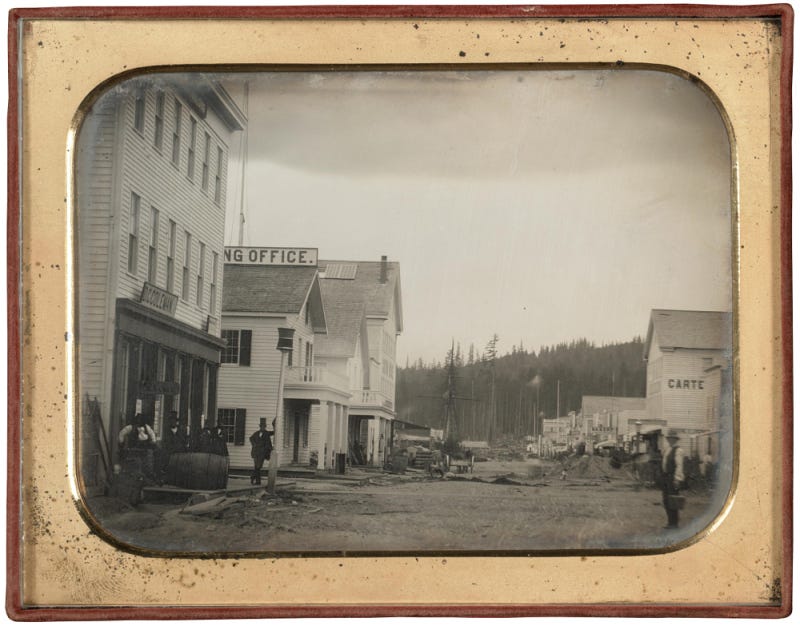
Buchtel was well-established in Portland by 1866, when he became involved in another one of the great events in the mid-19th century.
He established a base ball club.
*****
Stick and ball games have existed for most of recorded human history. There’s just something about whacking a ball that appeals to the human condition. The English game of rounders is widely credited as a precursor to baseball, but the truth is, numerous games played by children and adults coalesced into the game we now call baseball. In 1845, the Knickerbocker Rules, which are largely seen as the root of modern baseball rules, were produced and spread. Particularly in New York City, baseball became a popular pastime in the 1850s.
In 1866, Portland was growing and gaining a foothold as a major city in the State of Oregon. It also had plenty of young men who were familiar with the game of base ball and wanted to play. On May 28, 1866 a group, led by Buchtel, of young men “who are fond of athletic sports”2 met and organized what is believed to be the first base ball club in the northwest region.
The club was typical of base ball clubs across the country at that time. Mike Curtis, who has extensively researched the team, said the members “were mainly the communities’ white collar crowd. A comparison could be made to today’s golf country club members.” The players were as young as 18 and the oldest, Buchtel himself, was 35.3
The first advertised game for the new club was held on July 2 at their grounds near the Oregon Iron Works. The blurb in the newspaper promised the club was “patronized by the youth and beauty of our fair city” and “the matches are generally of the most gratifying character, both to the participants and the spectators.4
A few days later on July 6, an advertisement was placed in the newspaper for a game that would be held that evening at 6 1/2 o’clock. It was also the first reference to the name chosen for their club: The Pioneer Base Ball Club.
These early games were played amongst the members of the club. Two captains would select players before the game began. The most immediately noticeable difference with the modern game was that the fielders did not wear gloves. Although the players were the bankers, lawyers, and wealthy business owners of the day, they had to be willing to suffer for their sport; the ball certainly wasn’t soft.
The games were played with one umpire officiating. Balls and strikes weren’t a major part of the action, and were only given if the umpire thought either the pitcher or the batter was trying to delay the game. A player did not get a free base if they were hit by a pitch, and foul balls did not count as strikes. The rules of the game were written to encourage offense, so much so that many of those early baseball scores put football games to shame.
By the beginning of August, the club shifted its grounds to Oak Street between 5th and 6th Streets (the streets correspond with their modern day counterparts). On the new grounds, “Seats will be provided on the field for the accommodation of lady visitors.”5
The intra-squad game, divided into two teams, the “Batting Nine” and the “Fielding Nine”, on August 3rd was recorded by the Oregonian:
The results of the match, which are given below, shows conclusively that the “Pioneer’s” can safely challenge any similar organization for a match, and be almost sure of winning…We consider that the “Pioneer Club” have established for themselves a reputation of some consequence, by last evening’s exercise.6
The newspaper also published a box score, which was followed by a short description of the game by the Pioneer ‘s official scorer, H. T. Levins:
The fielding was so close that no home runs were made during the game by either nine. The expertness displayed by both sides is deserving of high commendation. The batting was excellent. Notwithstanding the irregularity of the field, the record shows that but two balls were missed. The weather was highly favorable, being cool, cloudy and still. The Batting Nine — Capt. Steel—won by but 4. The Fielding Nine—in three innings, played after the match—won by 5. L. Anderson, umpire. H.T. Levins, Scorer.7
Near the end of September, the Oregonian reported that the Clackamas Base Ball Club had formed upriver in Oregon City and was playing regularly. A couple weeks later, the Pioneers received a challenge from the new club, inviting them to travel to Oregon City for a match game. The Pioneers accepted and chose their best players, their First Nine, to face their first challenge from another club.
On Saturday, October 13th at 6 o’clock AM, the Pioneers and a number of fans, including “a number of ladies from this city”,8 began their journey to Oregon City by steamer. They were met there by the Clackamas Club and the Oregon City brass band. From there, the entire party went to Barlow House, the home of Clackamas Club president John L. Barlow, for breakfast. The Barlow family was prominent in Oregon City. John’s father Samuel had helped build the Barlow Road, which allowed for travel between The Dalles and the Willamette Valley at the end of the Oregon Trail.
Following breakfast, the party made the one-mile trek to the base ball grounds. The Pioneers jumped out to a big lead, scoring 20 and 22 runs in the first and second innings. Their scoring slowed down the rest of the game (perhaps intentionally, base ball was a gentlemanly sport, after all), and Clackamas was able to put up more runs as the game neared its end. The Pioneers had been organized and playing as a club much longer than Clackamas, and so the first known match game in Northwest baseball history ended with a Pioneer Base Ball Club victory of 77 to 45.
122 total runs scored during a game that lasted two hours and forty minutes. MLB could never.
The end of the match wasn’t the end of festivities, however. The whole crew trod back to Barlow House for lunch. After lunch, champagne was popped. Complimentary toasts were give by each club president to the other, as well as toasts to the ladies in attendance. The Oregonian noted, “Afterward facetious remarks and speeches were in order and many availed themselves of this opportunity of immortalization.”9
Pleased with the first match game and giddy from the champagne, the Pioneers and their traveling party returned home to Portland.
The Pioneers attempted to return the favor and host the Clackamas Club. But it was well into the fall season, and after three attempts that were rained out, the first baseball season in the northwest came to an end.
The Pioneers took their club so seriously that they sent a delegate, H.B. Hall to New York City that December for the annual convention of the National Association of Base Ball Players. Despite the name, it wasn’t an organization for players; it was an association made up of member clubs. Hall made the journey and the Pioneers became official members of the national baseball world.
*****
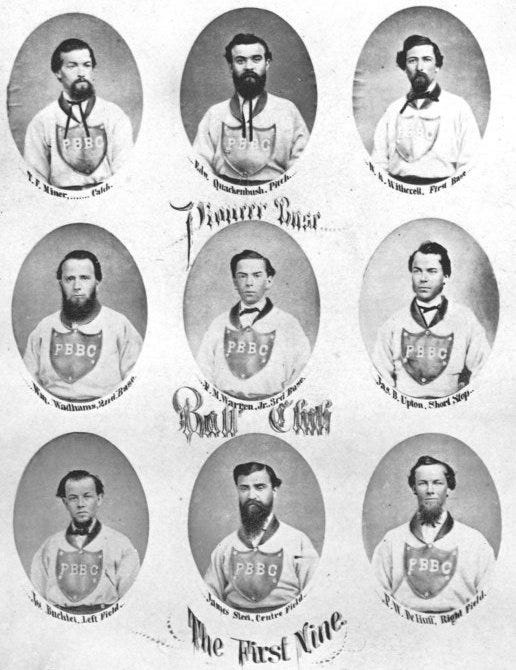
The 1867 baseball season began nearly as soon as the calendar turned. In February, a new club was formed across the Columbia River in Vancouver. The Occidental Base Ball Club was official by the end of the month with 18 members and elected officers, likely becoming the first club in Washington Territory.
These early base ball clubs weren’t simply a group of men who got together and decided to play baseball. They were serious social groups, and each had a structure and organization. The announcement of a new club was always followed by a list of officers: the president, vice-president, secretary, treasurer, captain of the first nine, and sometimes the captain of the second nine. The teams held meetings and voted on issues concerning the club, including whether to issue or accept challenges for match games.
The club members were from the upper class in society; they were merchants, bankers, lawyers. Members paid dues for the privilege of joining and playing. The Pioneers were included in a list of Portland Associations and Societies in a January 1867 issue of the Oregonian. It listed their official organization date as June 1, 1866, and their president as Theodore F. Miner, who also played catcher for the first nine.10
By March, the newspaper ran reports of the Occidentals and the Clackamas Club holding practices to prepare for match games that year. The Pioneers got started later, holding their first meeting in April in East Portland, then at Joseph Buchtel’s photography gallery on Morrison Street. His gallery became a popular meeting place for club business.
Although a member of the Pioneers and left fielder for the first nine, Buchtel was dedicated to the growth of baseball in the city. He offered his gallery as a meeting place for Portland’s second base ball club, the Wide-awake Base Ball Club, formed in the spring of 1867.
In May, the Pioneers received their first challenge, from the Occidental Base Ball Club. Gregory Paynter Shine, an historian at the Fort Vancouver National Historic Site explained the process of arranging games to Seamheads. He said it “provides a fascinating glimpse into the Victorian-era zeitgeist of order and organization. Protocol for one club wishing to play another club dictated that a formal challenge be forwarded to the prospective opponent, directed, of course, to the club’s secretary.”11
The Pioneers got a late start to their season—the other clubs had begun playing match games in April—because they were waiting for the return of H. B. Hall from his offseason travels to New York City for the National Association Convention. He brought back the latest established rules and the club didn’t want to begin the season without him, or risk running astray of the new rules they adopted by joining the National Association.12 He returned in May, and those new rules came into play in the Pioneer’s first the match game of the season, against the Occidentals.
On May 30, the Pioneers left at 6 AM aboard a steamer for Vancouver. The journey by river took 2 hours and 15 minutes (which is about what it can take in modern times during rush hour on the freeways). The Occidentals met them and escorted them to their grounds. The game began at 9 o’clock AM.
A couple weeks earlier, upon the return of Hall from New York, the Pioneers elected Ed Barkenstos as their umpire for the season. The National Association rules stated that “the Umpire in a match game must be chosen from a club being a member of that body.”13 Barkenstos was brought along and appointed to serve the role. But he only made it until the 2nd inning when a dispute arose and the Occidentals “became clamorous for a change”.14 A Vancouver newspaper alleged that Barkenstos’s calls were biased and that he seemed not to be paying attention to the game.15
The Pioneers, wishing to be good guests, opted to waive the rule and allowed the Occidentals to select another umpire. P. T. Barclay of the Clackamas Base Ball Club was in attendance, and he was appointed. Due to the rules, Barkenstos declared the game officially over after two innings and allowed it continue “for sport.”16
Another dispute arose in the third inning when the Occidental’s short stop and left fielder changed positions without the consent of the Pioneers. The teams made peace and the game continued without any further problems. The Pioneers won 79-62, the game taking 3 hours and 45 minutes.
Following the game, like in Oregon City, the Pioneers were treated to lunch and “liberal hospitality.”17 They may have had disagreements during the game, but the conventions of the time dictated they should behave like gentlemen and make nice regardless. It sounds like the hospitality helped ease any bitterness.
The Pioneers continued playing match games throughout the summer, establishing themselves as the premier team in the area. Games were always high-scoring by modern standards and lasted between 2 1/2 and 4 hours. The home team typically treated their visitors to a post-game dinner that seemed to always include plenty of libations. At the post-game dinner following the June rematch between the Pioneers and Clackamas, “The utmost good feeling prevailed and the party finally broke up at half-past nine, with expressions of mutual friendship and amity.”18 Translation: they were all schnockered.
While the Pioneers were the toast of the town, new baseball clubs seemed to form every day. Midway through the season, the Wide-awake Club was disbanded after several players left Portland. The remaining members formed a new Club called the Spartan Base Ball Club. The 1867 season also saw new clubs called the Athletic, Eclipse, Clear-away, Young Pioneer, Young America, Atlantic, Pacific, and Active, among others spring up in Portland. By the end of the season it was believed that there were 17 base ball clubs in that city alone. By 1868, the population of Portland was about 6,700 people.19
In the much smaller city of Vancouver, sometimes called Vancouver Village, at least four different clubs were formed in 1867. After the Occidentals, came the Sherman Base Ball Club. It was made up of Army personnel at Fort Vancouver. According to the Oregonian, the team was so-named because “a number of the members have been soldiers in Sherman’s army”,20 referring to the Union Civil War general William T. Sherman. Following the Shermans were the Continental Base Ball Club and the Washington Base Ball Club.
Oregon City added a couple teams to the Clackamas Club, the Scotch Highland Base Ball Club and the Tumwater Base Ball Club. Items were published around the state mentioning new clubs forming in Albany, Salem, Corvallis, and Eugene City.
While it seemed like everyone in the Northwest was catching baseball fever and forming clubs, the Idaho Statesman in Boise wasn’t sure what all the fuss was about:
The Webfoot papers occasionally get hard up for items: at which times the editors fall back on their own resources and become prostrate in their efforts to dish up brilliant locals…The prodigious strain was too great to be long continued and they weakened and fell back on the base ball clubs for material. The reports of the “innings” and “outings” of the ball club games which frequently appear in the Portland papers remind one of the “delinquent tax list” in a country newspaper, or an elaborate review of the multiplication table.”21
Later, the paper suggested that when people tired of the base ball mania, “mumble peg” should take its place as the national obsession.22
As the season was drawing to a close the Pioneers were considered by all to be the best team in the region. The Oregon State Fair, set for early October in Salem, was to include match games, with the intention of awarding a trophy bat to the winning team (The Idaho-Statesman sneered over this development, “The Oregon State Fairs have degenerated into an arena for horse-racing and base-ball playing.”23) The Pioneers wanted to play for a championship, but decorum dictated that they could not issue a challenge to another club. The club that was considered superior could only receive challenges.
So, they put an advertisement in the newspaper that they were accepting challenges for the state fair.
The Pioneers faced two teams at the State Fair. The opened against the Willamette Base Ball Club of Salem. The game got off to a shocking start when Edward Quackenbush of the Pioneers hit a rocket straight back to the Willamette pitcher, William Wythe, breaking his collar bone. It was only a momentary disruption, though. Wythe’s father was present and presumably a doctor because the Corvallis newspaper reported that his father set the bone, and William was back to cheer on this club less than an hour later.24 Unfortunately, his club was no match for the Pioneers and lost, 92 to 25.
The Pioneers faced the Clackamas Base Ball Club for the championship on October 13. It was an echo of their match game the year before, the first clubs in the region, now simply two of many.
Unfortunately, there wasn’t a box score or a long description of the game. In a column describing the happenings at the fair, the Oregonian shared the following:
The match game of Base Ball between the Pioneers, of Portland, and the Clackamas, of Oregon City, was one of the most exciting features of the day. It lasted for several hours and engaged the attention of hundreds of people. The game was very evenly played and drew out the vest energies of the players. The “crowd” caught the spirit of the game, and often waved hats and handkerchiefs and cheered. Surely Base Ball is in the brain, (and probably fills many a one). The innings were even, but the Pioneers made 57 runs and the Clackamas but 53.25
The Pioneers were the Oregon State Champions. But more than that, the game they began in the Northwest would only continue to grow.
As for Idaho, in the spring of 1868 , the first base ball club was formed in Boise. You could try to resist, but you couldn’t fight base ball fever.
*****
The Pioneer Base Ball Club existed in some form until 1877, with Buchtel as a player, and later, manager. An obituary said he continued to pitch for 15 years,26 which would made him 50 years old when he left baseball. He tried to form an association of clubs that included Oregon, Washington, and Idaho, but the association only lasted a couple years. The game had grown big enough that each state and territory could form its own association.
Buchtel was an advocate for bridges in Portland and was heavily involved in the fight against steamer and ferry operators to build a bridge. When the Morrison Street Bridge finally opened in 1887, he led the first procession to cross the bridge. He participated in laying the first street car tracks, he served as the Multnomah County Sheriff, and organized the Multnomah Fire Engine Company, serving as chief of the volunteer department and established the paid department.
The early Base Ball Clubs were staunchly amateur; it would be unseemly for such gentlemen to even contemplate making money at baseball. In 1884, however, Buchtel began a team in East Portland called the Willamettes. In 1890, the team became the Portland Webfeet and the first professional baseball team in the region, which led to the organization of the first professional baseball league in the region and included teams from Portland, Seattle, Tacoma, and Spokane. But we’ll get to all that another time.
Buchtel died in 1916, at the age of 85. He lived long enough to see Portland become a thriving city and baseball become a national obsession with leagues major and minor across the country.
The sport of baseball was so purposely built up around nostalgia from the beginning that I often wonder if the early players and clubs were aware of that and what they were creating. Either way, I think it’s pretty cool that the driving force behind Portland baseball lived long enough to see the sport he helped establish become the National Pastime.
*****
There’s a certain appeal to the mid-19th century. Much like military aficionados are drawn to Civil War reenactments, baseball fans with that 19th century bug have formed vintage base ball clubs to reenact the game as it was played then. And, as it was back then, the Pioneer Base Ball Club of Portland is the most prominent vintage base ball team in the Northwest. The travel around the Portland area, playing teams that they would have played in 1867 and beyond. The team began playing in the early 2000s, and continues with a couple games a year to this day.
I highly recommend taking a look at the team’s Facebook page. It has information on their games, and the photo section has a number of historical photos and documents.
https://alliance-uoregon.primo.exlibrisgroup.com/discovery/fulldisplay?docid=alma99900464153901852&context=L&vid=01ALLIANCE_UO:UO&tab=default_tab&adaptor=Local%20Search%20Engine&lang=en
The Oregonian, May 30, 1866, 3.
https://seamheads.com/2009/07/20/pioneer-club-celebrates-origins-of-baseball-in-pacific-northwest
The Oregonian, June 30, 1866, 3.
The Oregonian, August 3, 1866, 3.
The Oregonian, August 3, 1866, 3.
The Oregonian, August 4, 1866, 3.
The Oregonian, October 15, 1866, 3.
The Oregonian, October 15, 1866, 3.
The Oregonian, January 10, 1967, 3.
https://seamheads.com/2009/07/20/pioneer-club-celebrates-origins-of-baseball-in-pacific-northwest/
The Oregonian, March 29, 1867, 3.
The Oregonian, May 30, 1867, 3.
The Oregonian, May 30, 1867, 3.
https://www.nps.gov/articles/baseballatvancouverbarracks.htm
The Oregonian, May 30, 1867, 3.
The Oregonian, May 30, 1867, 3.
The Oregonian, June 18, 1867, 3.
William Reid (1879), Progress of Oregon and Portland from 1868 to 1878, Portland, Or: D.H. Stearns & Co., OL 25160344M
The Oregonian, June 11, 1867, 3.
The Idaho Statesman, July 27, 1867, 2.
The Idaho Statesman, August 20, 1867, 2.
The Idaho Statesman, October 17, 1867, 2.
Corvallis Gazette-Times, October 12, 1867, 2.
The Oregonian, October 14, 1867, 2.
“Joseph Buchtel, 86, Pioneer of Oregon, Dies At His Home,” The Oregon Daily Journal, August 11, 1916, 9.



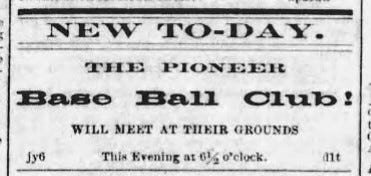
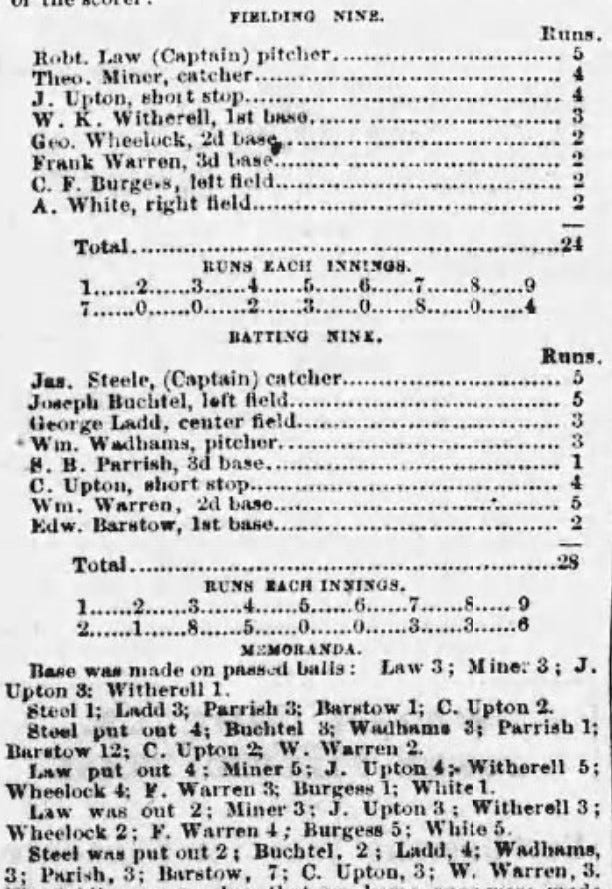

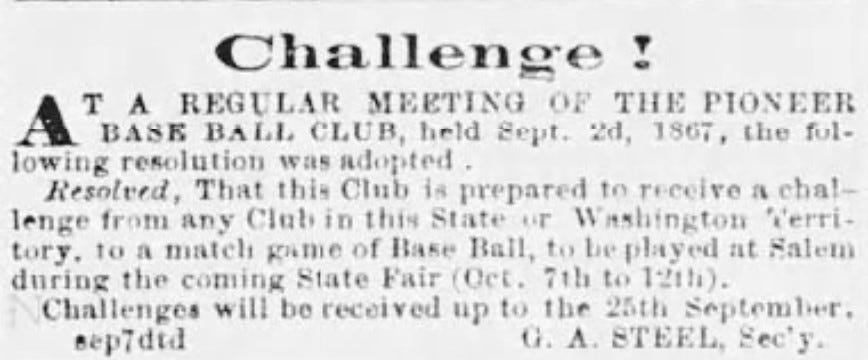
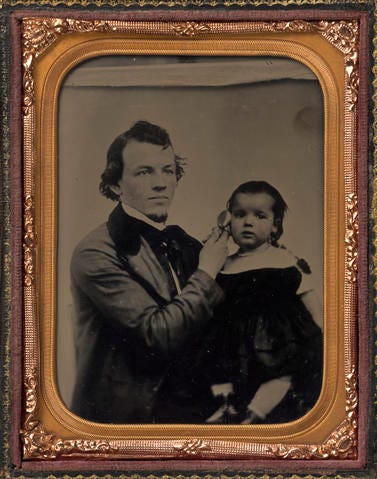
Yeah I'm nerding out hard here
This is the sort of content that makes me want to attend the Ivor-Campbell Conference on 19th Century baseball.